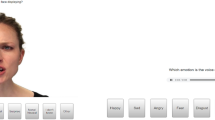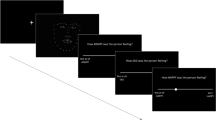Abstract
Although previous studies seem to indicate that alexithymic individuals have a deficit in their ability to recognize emotional stimuli, none had studied the relationship between alexithymia and verbal and non verbal abilities and their possible role in emotion recognition. The aim of the present study is to further investigate the relationship between alexithymia and emotion recognition ability. In particular we studied whether this relationship is mediated by verbal ability. Thirty-five students were selected from a group of 91 University students previously screened for alexithymia (Toronto Alexithymia Scale; TAS-20). Participants were shown black and white slides depicting facial expression of the following emotions: anger, sadness, disgust, surprise, happiness and fear. Compared to low alexithymic participants, and, more importantly, taking verbal IQ into account, high alexithymic and low alexithymic participants did not differ in emotion recognition.

Similar content being viewed by others
References
Lane RD, Schwartz GE: Levels of emotional awareness: A cognitive-developmental theory and its application to Psychopathology. Journal of American Psychiatry 144:133–143, 1987
Mayer JD, DiPaolo M, Salovey P: Perceiving affective content in ambiguous visual stimuli: A component of emotional intelligence. Journal of Personality Assessment 54:772–307, 1990
Berembaum H, Prince J: Alexithymia and the interpretation of emotion-relevant information. Cognition and Emotion 5:19–30, 1994
McDonald PW, Prkachin KW: The Expression and perception of facial emotion in alexithymia: A pilot study. Psychosomatic Medicine 52:199–210, 1990
Jessimer M, Markham R: Alexithymia: A right hemisphere dysfunction specific to recognition of certain facial expressions? Brain Cognition 34:246–258, 1997
Mann LS, Wise TN, Trinidad A, et al.: Alexithymia, affect recognition, and five factors of personality in substance abusers. Perceptual and Motor Skills 81:35–40, 1994
Lane RD, Sechrest L, Reidel R, et al.: Pervasive emotion recognition deficit common to alexithymia and the repressive coping style. Psychosomatic Medicine 62:492–501, 2000
Parker JDA, Taylor, GJ, Bagby RM: The relationship between emotional intelligence and alexithymia. Personality and Individual Differences 30:107–115, 2001
Taylor GJ, Bagby RM: Measurement of alexithymia: recommendations for clinical practice and future research. Psychiatric Clinic of North America 11:351–366, 1988
Pandey R, Mandal MK: Processing of facial expression of emotion and alexithymia. British Journal of Clinical Psychology 3:631–633, 1997
Valdes M, Jodar I, Ojuel J, et al.: Alexithymia and verbal intelligence: a psychometric study. Actas Espanolas de Psiquiatria 29:338–342, 2001
Suslow T, Junghans K: Impairments of emotion situation priming in alexithymia. Personality and Individual Differences 32:541–550, 2002
Lamberty GJ, Holt HS: Evidence for a verbal deficit in alexithymia. Neuropsychiatry and Clinical Neurosciences 7:320–324, 1995
Suslow T, Kersting A, Arolt V: Alexithymia and incidental learning of emotional words. Psychological Reports 66(4):335–345, 2003
Lane RD, Sechrest L, Reidel R, et al.: Impaired verbal and nonverbal emotion recognition in alexithymia. Psychosomatic Medicine 58:203–210, 1996
Kokkonen P, Veijola J, Karvonen JT, et al.: Ability to speak at the age of 1 year and alexithymia 30 years later. Journal of Psychosomatic Research 54:491–495, 2003
Hendryx MS, Haviland MG, Shaw DG: Dimensions of alexithymia and their relationships to anxiety and depression. Journal of Personality Assessment 56:227–237, 1991
Kirmayer LJ, Robbins JM: Cognitive and social correlates of the Toronto Alexithymia Scale. Psychosomatics 34:41–52, 1993
Feinberg TE, Rifkin A, Schaffer C, et al.: Facial discrimination and emotional recognition in schizophrenia and affective disorders. Archives of General Psychiatry 43:276–279, 1986
Mikhailova ES, Vladimirova TV, Iznak AF, et al.: Abnormal recognition of facial expression of emotions in depressed patients with major depression disorder and schizotypal personality disorder. Biological Psychiatry 40(8):697–705, 1996
Coren SP, Porac C, Duncan P: A behaviorally validated self-report inventory to assess 4 types of lateral preferences. Journal of Clinical Neuropsychology 1:55–64, 1979
Bressi C, Taylor GJ, Parker JDA, et al.: Cross validation of the factor structure of the 20-Item Toronto Alexithymia Scale: An Italian multicenter study. Journal of Psychosomatic Research 41:551–559, 1996
Bagby R, Parker J, Taylor G.: The twenty-item Toronto Alexithymia Scale-I. Item selection and cross validation of the factor structure. Journal of Psychosomatic Research 38:23–32, 1994a
Bagby RM, Taylor GJ, Parker JDA: The Twenty-Item Toronto Alexithymia Scale-II. Convergent discriminant, and concurrent validity. Journal of Psychosomatic Research 38:33–40, 1994b
Taylor GJ, Bagby RM, Ryan DP, et al.: Disorders of affect regulation: Alexithymia in medical and psychiatric illness. Cambridge, Cambridge University Press, 1997
Taylor GJ, Bagby, RM, Ryan DP, et al.: Validation of the alexithymia construct: A measurement-based approach. Canadian Journal of Psychiatry 35:290–297, 1990
Beck AT, Steer RA: Beck Depression Inventory, Manual. San Antonio, TX, The Psychological Corporation, 1993
Pedrabissi L, Santinello M, Spielberger CD: 1983. Ad. It. (a cura di). Inventario per l’ansia di stato e l’ansia di tratto. Firenze, Organizzazioni Speciali, 1996
Wechsler D: Wechsler Adult Intelligence Scale—Revised (WAIS-R), Manuale. Firenze, Organizzazioni Speciali, 1997
Orsini A, Laicardi C: WAIS-R, Contributo alla taratura italiana. Firenze, Organizzazioni Speciali, 1997
Ekman P, Friesen WV: Unmasking the Face. Englewood Cliffs, NJ: Prentice-Hall, 1976
Parker JDA, Taylor GJ, Bagby RM: Alexithymia and the recognition of facial expressions of emotion. Psychotherapy and Psychosomatics 59:197–202, 1993
Honkalampi K, Hintikka J, Tanskanen A, et al.: Depression is strongly associated with alexithymia in the general population. Journal of Psychosomatic Research 48(1):99–104, 2000
Lane PJ, Quinlan DM, Schwartz GE, et al.: The levels of emotional awareness scale: A cognitive-developmental measure of emotion. Journal of Personality Assessment 55:124–134, 1990
Author information
Authors and Affiliations
Corresponding author
Rights and permissions
About this article
Cite this article
Montebarocci, O., Surcinelli, P., Rossi, N. et al. Alexithymia, Verbal Ability and Emotion Recognition. Psychiatr Q 82, 245–252 (2011). https://doi.org/10.1007/s11126-010-9166-7
Published:
Issue Date:
DOI: https://doi.org/10.1007/s11126-010-9166-7




